Organisational Behaviour Report: BBC Team Performance Analysis
VerifiedAdded on 2020/06/05
|15
|4747
|39
Report
AI Summary
This report provides a comprehensive analysis of organisational behaviour, focusing on the British Broadcasting Corporation (BBC). It begins by examining Handy's cultural typology and its application to BBC's organizational culture, exploring the influence of power and politics. The report then delves into motivational theories, contrasting content and process theories, and discusses various techniques to enhance employee working efficiency, including Maslow's, Herzberg's, and Alderfer's theories, along with Vroom's and Adam's theories. The analysis extends to team dynamics, differentiating between effective and ineffective teams, and proposing organizational theories to improve team performance while identifying potential barriers. The report concludes with recommendations to enhance overall organisational effectiveness within the BBC, drawing on the interplay of culture, motivation, and team dynamics to foster a productive and collaborative work environment. The report emphasizes the importance of leadership, skills, working environment, and attitude to achieve organisational goals.
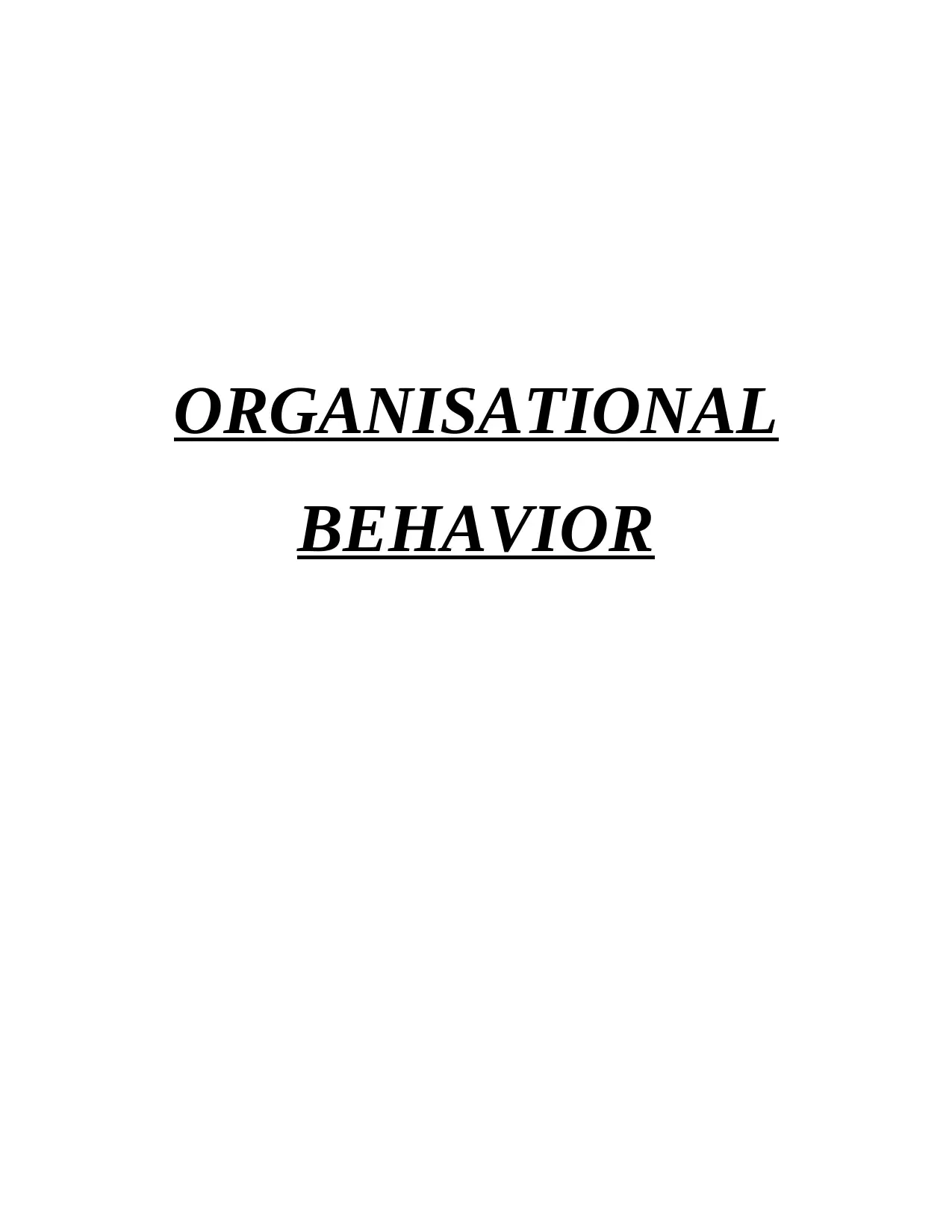
ORGANISATIONAL
BEHAVIOR
BEHAVIOR
Paraphrase This Document
Need a fresh take? Get an instant paraphrase of this document with our AI Paraphraser
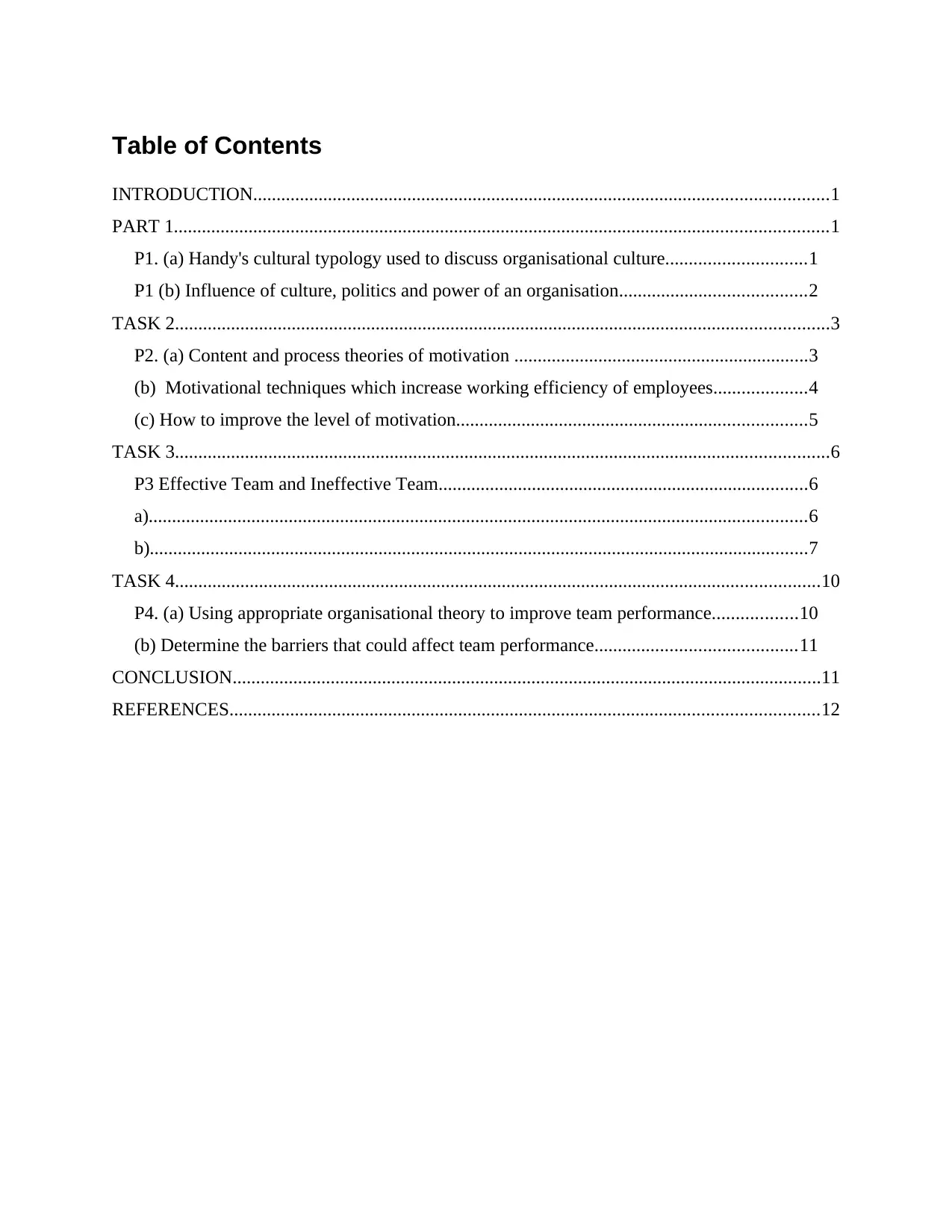
Table of Contents
INTRODUCTION...........................................................................................................................1
PART 1............................................................................................................................................1
P1. (a) Handy's cultural typology used to discuss organisational culture..............................1
P1 (b) Influence of culture, politics and power of an organisation........................................2
TASK 2............................................................................................................................................3
P2. (a) Content and process theories of motivation ...............................................................3
(b) Motivational techniques which increase working efficiency of employees....................4
(c) How to improve the level of motivation...........................................................................5
TASK 3............................................................................................................................................6
P3 Effective Team and Ineffective Team...............................................................................6
a).............................................................................................................................................6
b).............................................................................................................................................7
TASK 4..........................................................................................................................................10
P4. (a) Using appropriate organisational theory to improve team performance..................10
(b) Determine the barriers that could affect team performance...........................................11
CONCLUSION..............................................................................................................................11
REFERENCES..............................................................................................................................12
INTRODUCTION...........................................................................................................................1
PART 1............................................................................................................................................1
P1. (a) Handy's cultural typology used to discuss organisational culture..............................1
P1 (b) Influence of culture, politics and power of an organisation........................................2
TASK 2............................................................................................................................................3
P2. (a) Content and process theories of motivation ...............................................................3
(b) Motivational techniques which increase working efficiency of employees....................4
(c) How to improve the level of motivation...........................................................................5
TASK 3............................................................................................................................................6
P3 Effective Team and Ineffective Team...............................................................................6
a).............................................................................................................................................6
b).............................................................................................................................................7
TASK 4..........................................................................................................................................10
P4. (a) Using appropriate organisational theory to improve team performance..................10
(b) Determine the barriers that could affect team performance...........................................11
CONCLUSION..............................................................................................................................11
REFERENCES..............................................................................................................................12
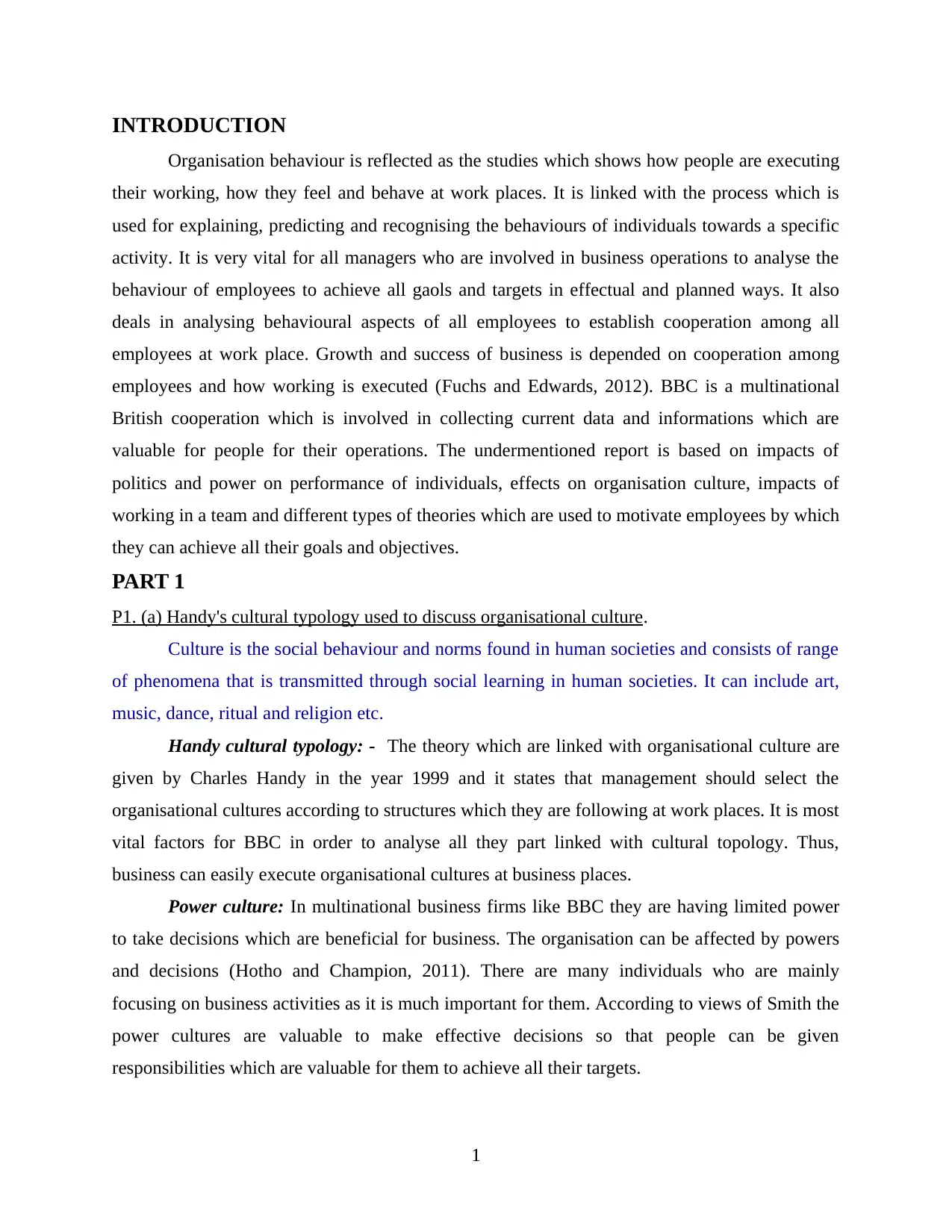
INTRODUCTION
Organisation behaviour is reflected as the studies which shows how people are executing
their working, how they feel and behave at work places. It is linked with the process which is
used for explaining, predicting and recognising the behaviours of individuals towards a specific
activity. It is very vital for all managers who are involved in business operations to analyse the
behaviour of employees to achieve all gaols and targets in effectual and planned ways. It also
deals in analysing behavioural aspects of all employees to establish cooperation among all
employees at work place. Growth and success of business is depended on cooperation among
employees and how working is executed (Fuchs and Edwards, 2012). BBC is a multinational
British cooperation which is involved in collecting current data and informations which are
valuable for people for their operations. The undermentioned report is based on impacts of
politics and power on performance of individuals, effects on organisation culture, impacts of
working in a team and different types of theories which are used to motivate employees by which
they can achieve all their goals and objectives.
PART 1
P1. (a) Handy's cultural typology used to discuss organisational culture.
Culture is the social behaviour and norms found in human societies and consists of range
of phenomena that is transmitted through social learning in human societies. It can include art,
music, dance, ritual and religion etc.
Handy cultural typology: - The theory which are linked with organisational culture are
given by Charles Handy in the year 1999 and it states that management should select the
organisational cultures according to structures which they are following at work places. It is most
vital factors for BBC in order to analyse all they part linked with cultural topology. Thus,
business can easily execute organisational cultures at business places.
Power culture: In multinational business firms like BBC they are having limited power
to take decisions which are beneficial for business. The organisation can be affected by powers
and decisions (Hotho and Champion, 2011). There are many individuals who are mainly
focusing on business activities as it is much important for them. According to views of Smith the
power cultures are valuable to make effective decisions so that people can be given
responsibilities which are valuable for them to achieve all their targets.
1
Organisation behaviour is reflected as the studies which shows how people are executing
their working, how they feel and behave at work places. It is linked with the process which is
used for explaining, predicting and recognising the behaviours of individuals towards a specific
activity. It is very vital for all managers who are involved in business operations to analyse the
behaviour of employees to achieve all gaols and targets in effectual and planned ways. It also
deals in analysing behavioural aspects of all employees to establish cooperation among all
employees at work place. Growth and success of business is depended on cooperation among
employees and how working is executed (Fuchs and Edwards, 2012). BBC is a multinational
British cooperation which is involved in collecting current data and informations which are
valuable for people for their operations. The undermentioned report is based on impacts of
politics and power on performance of individuals, effects on organisation culture, impacts of
working in a team and different types of theories which are used to motivate employees by which
they can achieve all their goals and objectives.
PART 1
P1. (a) Handy's cultural typology used to discuss organisational culture.
Culture is the social behaviour and norms found in human societies and consists of range
of phenomena that is transmitted through social learning in human societies. It can include art,
music, dance, ritual and religion etc.
Handy cultural typology: - The theory which are linked with organisational culture are
given by Charles Handy in the year 1999 and it states that management should select the
organisational cultures according to structures which they are following at work places. It is most
vital factors for BBC in order to analyse all they part linked with cultural topology. Thus,
business can easily execute organisational cultures at business places.
Power culture: In multinational business firms like BBC they are having limited power
to take decisions which are beneficial for business. The organisation can be affected by powers
and decisions (Hotho and Champion, 2011). There are many individuals who are mainly
focusing on business activities as it is much important for them. According to views of Smith the
power cultures are valuable to make effective decisions so that people can be given
responsibilities which are valuable for them to achieve all their targets.
1
⊘ This is a preview!⊘
Do you want full access?
Subscribe today to unlock all pages.

Trusted by 1+ million students worldwide
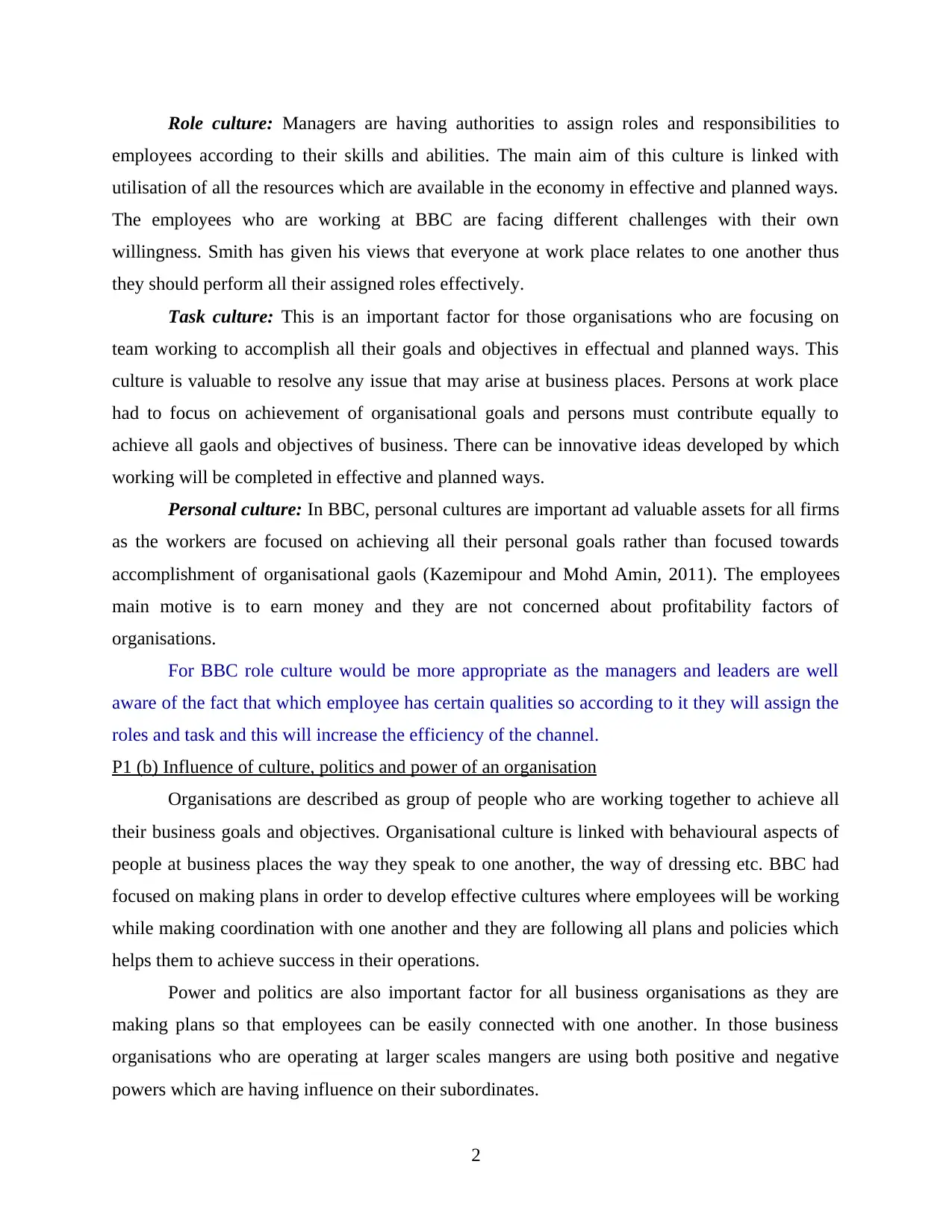
Role culture: Managers are having authorities to assign roles and responsibilities to
employees according to their skills and abilities. The main aim of this culture is linked with
utilisation of all the resources which are available in the economy in effective and planned ways.
The employees who are working at BBC are facing different challenges with their own
willingness. Smith has given his views that everyone at work place relates to one another thus
they should perform all their assigned roles effectively.
Task culture: This is an important factor for those organisations who are focusing on
team working to accomplish all their goals and objectives in effectual and planned ways. This
culture is valuable to resolve any issue that may arise at business places. Persons at work place
had to focus on achievement of organisational goals and persons must contribute equally to
achieve all gaols and objectives of business. There can be innovative ideas developed by which
working will be completed in effective and planned ways.
Personal culture: In BBC, personal cultures are important ad valuable assets for all firms
as the workers are focused on achieving all their personal goals rather than focused towards
accomplishment of organisational gaols (Kazemipour and Mohd Amin, 2011). The employees
main motive is to earn money and they are not concerned about profitability factors of
organisations.
For BBC role culture would be more appropriate as the managers and leaders are well
aware of the fact that which employee has certain qualities so according to it they will assign the
roles and task and this will increase the efficiency of the channel.
P1 (b) Influence of culture, politics and power of an organisation
Organisations are described as group of people who are working together to achieve all
their business goals and objectives. Organisational culture is linked with behavioural aspects of
people at business places the way they speak to one another, the way of dressing etc. BBC had
focused on making plans in order to develop effective cultures where employees will be working
while making coordination with one another and they are following all plans and policies which
helps them to achieve success in their operations.
Power and politics are also important factor for all business organisations as they are
making plans so that employees can be easily connected with one another. In those business
organisations who are operating at larger scales mangers are using both positive and negative
powers which are having influence on their subordinates.
2
employees according to their skills and abilities. The main aim of this culture is linked with
utilisation of all the resources which are available in the economy in effective and planned ways.
The employees who are working at BBC are facing different challenges with their own
willingness. Smith has given his views that everyone at work place relates to one another thus
they should perform all their assigned roles effectively.
Task culture: This is an important factor for those organisations who are focusing on
team working to accomplish all their goals and objectives in effectual and planned ways. This
culture is valuable to resolve any issue that may arise at business places. Persons at work place
had to focus on achievement of organisational goals and persons must contribute equally to
achieve all gaols and objectives of business. There can be innovative ideas developed by which
working will be completed in effective and planned ways.
Personal culture: In BBC, personal cultures are important ad valuable assets for all firms
as the workers are focused on achieving all their personal goals rather than focused towards
accomplishment of organisational gaols (Kazemipour and Mohd Amin, 2011). The employees
main motive is to earn money and they are not concerned about profitability factors of
organisations.
For BBC role culture would be more appropriate as the managers and leaders are well
aware of the fact that which employee has certain qualities so according to it they will assign the
roles and task and this will increase the efficiency of the channel.
P1 (b) Influence of culture, politics and power of an organisation
Organisations are described as group of people who are working together to achieve all
their business goals and objectives. Organisational culture is linked with behavioural aspects of
people at business places the way they speak to one another, the way of dressing etc. BBC had
focused on making plans in order to develop effective cultures where employees will be working
while making coordination with one another and they are following all plans and policies which
helps them to achieve success in their operations.
Power and politics are also important factor for all business organisations as they are
making plans so that employees can be easily connected with one another. In those business
organisations who are operating at larger scales mangers are using both positive and negative
powers which are having influence on their subordinates.
2
Paraphrase This Document
Need a fresh take? Get an instant paraphrase of this document with our AI Paraphraser
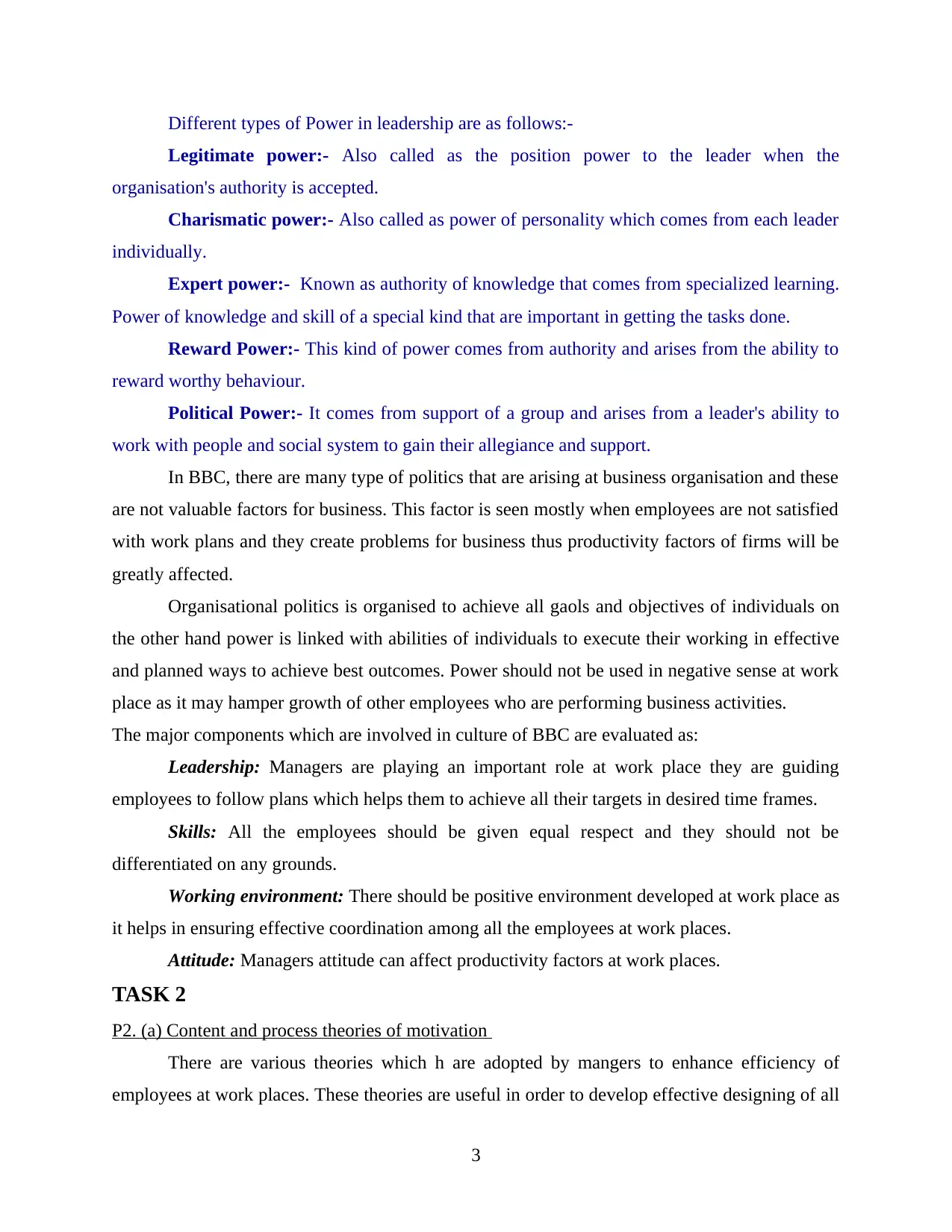
Different types of Power in leadership are as follows:-
Legitimate power:- Also called as the position power to the leader when the
organisation's authority is accepted.
Charismatic power:- Also called as power of personality which comes from each leader
individually.
Expert power:- Known as authority of knowledge that comes from specialized learning.
Power of knowledge and skill of a special kind that are important in getting the tasks done.
Reward Power:- This kind of power comes from authority and arises from the ability to
reward worthy behaviour.
Political Power:- It comes from support of a group and arises from a leader's ability to
work with people and social system to gain their allegiance and support.
In BBC, there are many type of politics that are arising at business organisation and these
are not valuable factors for business. This factor is seen mostly when employees are not satisfied
with work plans and they create problems for business thus productivity factors of firms will be
greatly affected.
Organisational politics is organised to achieve all gaols and objectives of individuals on
the other hand power is linked with abilities of individuals to execute their working in effective
and planned ways to achieve best outcomes. Power should not be used in negative sense at work
place as it may hamper growth of other employees who are performing business activities.
The major components which are involved in culture of BBC are evaluated as:
Leadership: Managers are playing an important role at work place they are guiding
employees to follow plans which helps them to achieve all their targets in desired time frames.
Skills: All the employees should be given equal respect and they should not be
differentiated on any grounds.
Working environment: There should be positive environment developed at work place as
it helps in ensuring effective coordination among all the employees at work places.
Attitude: Managers attitude can affect productivity factors at work places.
TASK 2
P2. (a) Content and process theories of motivation
There are various theories which h are adopted by mangers to enhance efficiency of
employees at work places. These theories are useful in order to develop effective designing of all
3
Legitimate power:- Also called as the position power to the leader when the
organisation's authority is accepted.
Charismatic power:- Also called as power of personality which comes from each leader
individually.
Expert power:- Known as authority of knowledge that comes from specialized learning.
Power of knowledge and skill of a special kind that are important in getting the tasks done.
Reward Power:- This kind of power comes from authority and arises from the ability to
reward worthy behaviour.
Political Power:- It comes from support of a group and arises from a leader's ability to
work with people and social system to gain their allegiance and support.
In BBC, there are many type of politics that are arising at business organisation and these
are not valuable factors for business. This factor is seen mostly when employees are not satisfied
with work plans and they create problems for business thus productivity factors of firms will be
greatly affected.
Organisational politics is organised to achieve all gaols and objectives of individuals on
the other hand power is linked with abilities of individuals to execute their working in effective
and planned ways to achieve best outcomes. Power should not be used in negative sense at work
place as it may hamper growth of other employees who are performing business activities.
The major components which are involved in culture of BBC are evaluated as:
Leadership: Managers are playing an important role at work place they are guiding
employees to follow plans which helps them to achieve all their targets in desired time frames.
Skills: All the employees should be given equal respect and they should not be
differentiated on any grounds.
Working environment: There should be positive environment developed at work place as
it helps in ensuring effective coordination among all the employees at work places.
Attitude: Managers attitude can affect productivity factors at work places.
TASK 2
P2. (a) Content and process theories of motivation
There are various theories which h are adopted by mangers to enhance efficiency of
employees at work places. These theories are useful in order to develop effective designing of all
3
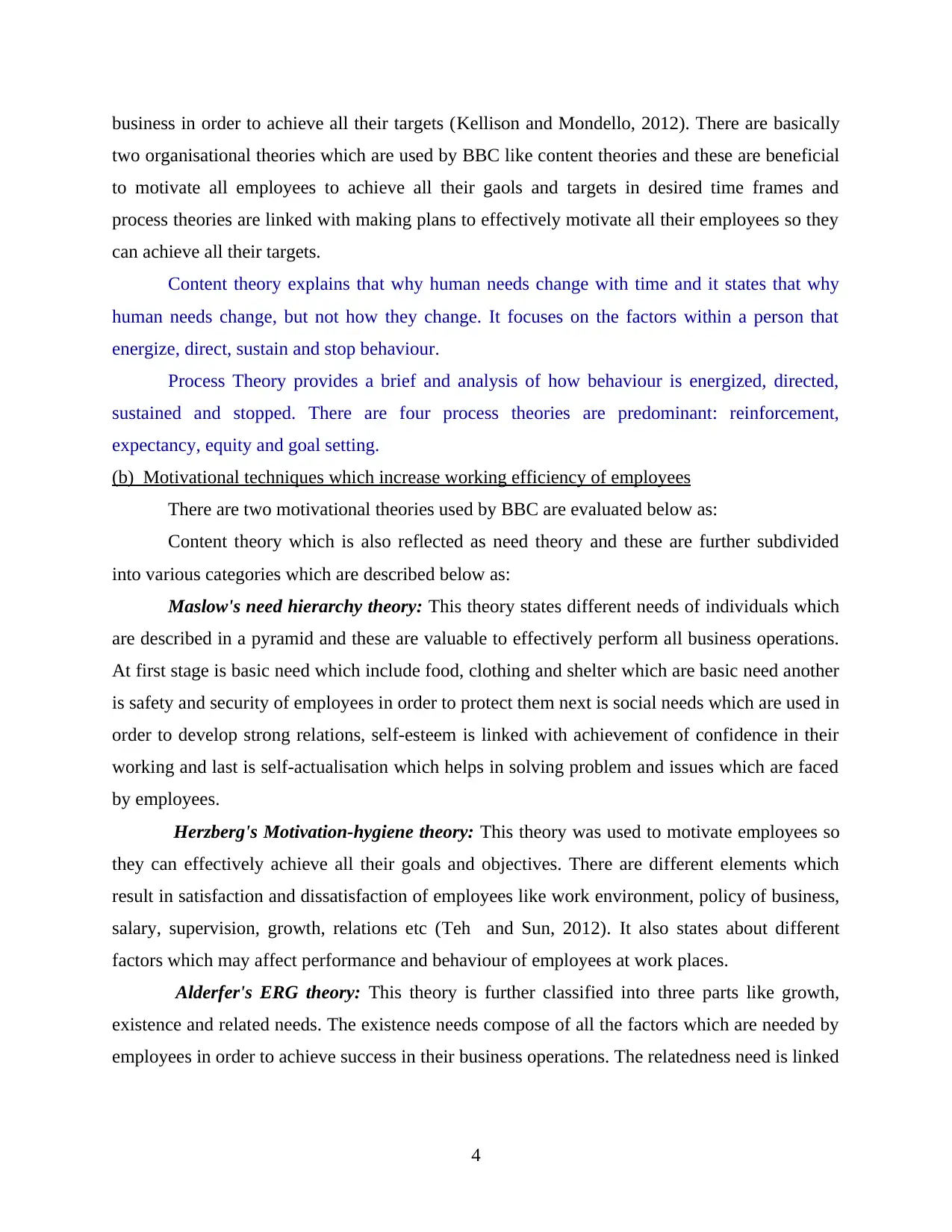
business in order to achieve all their targets (Kellison and Mondello, 2012). There are basically
two organisational theories which are used by BBC like content theories and these are beneficial
to motivate all employees to achieve all their gaols and targets in desired time frames and
process theories are linked with making plans to effectively motivate all their employees so they
can achieve all their targets.
Content theory explains that why human needs change with time and it states that why
human needs change, but not how they change. It focuses on the factors within a person that
energize, direct, sustain and stop behaviour.
Process Theory provides a brief and analysis of how behaviour is energized, directed,
sustained and stopped. There are four process theories are predominant: reinforcement,
expectancy, equity and goal setting.
(b) Motivational techniques which increase working efficiency of employees
There are two motivational theories used by BBC are evaluated below as:
Content theory which is also reflected as need theory and these are further subdivided
into various categories which are described below as:
Maslow's need hierarchy theory: This theory states different needs of individuals which
are described in a pyramid and these are valuable to effectively perform all business operations.
At first stage is basic need which include food, clothing and shelter which are basic need another
is safety and security of employees in order to protect them next is social needs which are used in
order to develop strong relations, self-esteem is linked with achievement of confidence in their
working and last is self-actualisation which helps in solving problem and issues which are faced
by employees.
Herzberg's Motivation-hygiene theory: This theory was used to motivate employees so
they can effectively achieve all their goals and objectives. There are different elements which
result in satisfaction and dissatisfaction of employees like work environment, policy of business,
salary, supervision, growth, relations etc (Teh and Sun, 2012). It also states about different
factors which may affect performance and behaviour of employees at work places.
Alderfer's ERG theory: This theory is further classified into three parts like growth,
existence and related needs. The existence needs compose of all the factors which are needed by
employees in order to achieve success in their business operations. The relatedness need is linked
4
two organisational theories which are used by BBC like content theories and these are beneficial
to motivate all employees to achieve all their gaols and targets in desired time frames and
process theories are linked with making plans to effectively motivate all their employees so they
can achieve all their targets.
Content theory explains that why human needs change with time and it states that why
human needs change, but not how they change. It focuses on the factors within a person that
energize, direct, sustain and stop behaviour.
Process Theory provides a brief and analysis of how behaviour is energized, directed,
sustained and stopped. There are four process theories are predominant: reinforcement,
expectancy, equity and goal setting.
(b) Motivational techniques which increase working efficiency of employees
There are two motivational theories used by BBC are evaluated below as:
Content theory which is also reflected as need theory and these are further subdivided
into various categories which are described below as:
Maslow's need hierarchy theory: This theory states different needs of individuals which
are described in a pyramid and these are valuable to effectively perform all business operations.
At first stage is basic need which include food, clothing and shelter which are basic need another
is safety and security of employees in order to protect them next is social needs which are used in
order to develop strong relations, self-esteem is linked with achievement of confidence in their
working and last is self-actualisation which helps in solving problem and issues which are faced
by employees.
Herzberg's Motivation-hygiene theory: This theory was used to motivate employees so
they can effectively achieve all their goals and objectives. There are different elements which
result in satisfaction and dissatisfaction of employees like work environment, policy of business,
salary, supervision, growth, relations etc (Teh and Sun, 2012). It also states about different
factors which may affect performance and behaviour of employees at work places.
Alderfer's ERG theory: This theory is further classified into three parts like growth,
existence and related needs. The existence needs compose of all the factors which are needed by
employees in order to achieve success in their business operations. The relatedness need is linked
4
⊘ This is a preview!⊘
Do you want full access?
Subscribe today to unlock all pages.

Trusted by 1+ million students worldwide
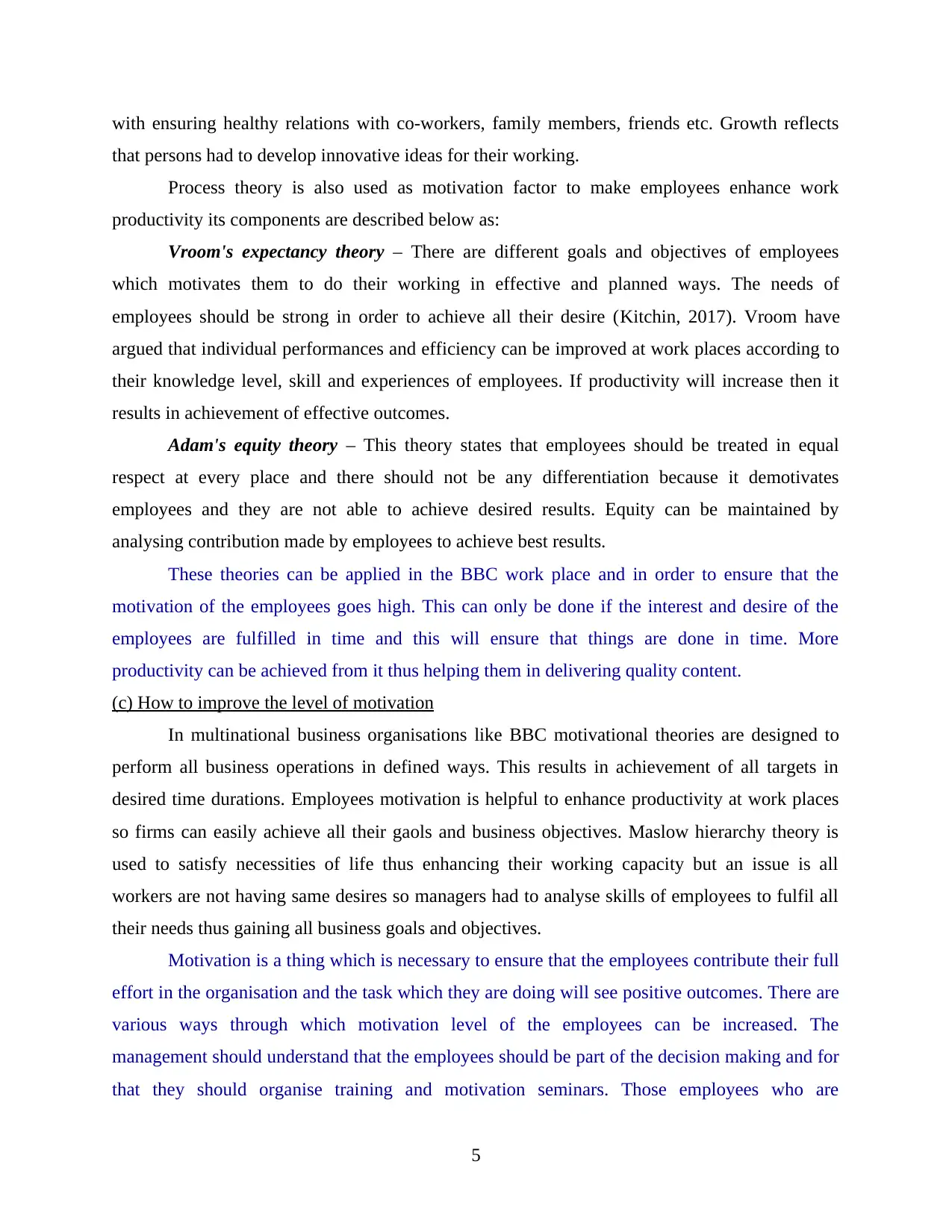
with ensuring healthy relations with co-workers, family members, friends etc. Growth reflects
that persons had to develop innovative ideas for their working.
Process theory is also used as motivation factor to make employees enhance work
productivity its components are described below as:
Vroom's expectancy theory – There are different goals and objectives of employees
which motivates them to do their working in effective and planned ways. The needs of
employees should be strong in order to achieve all their desire (Kitchin, 2017). Vroom have
argued that individual performances and efficiency can be improved at work places according to
their knowledge level, skill and experiences of employees. If productivity will increase then it
results in achievement of effective outcomes.
Adam's equity theory – This theory states that employees should be treated in equal
respect at every place and there should not be any differentiation because it demotivates
employees and they are not able to achieve desired results. Equity can be maintained by
analysing contribution made by employees to achieve best results.
These theories can be applied in the BBC work place and in order to ensure that the
motivation of the employees goes high. This can only be done if the interest and desire of the
employees are fulfilled in time and this will ensure that things are done in time. More
productivity can be achieved from it thus helping them in delivering quality content.
(c) How to improve the level of motivation
In multinational business organisations like BBC motivational theories are designed to
perform all business operations in defined ways. This results in achievement of all targets in
desired time durations. Employees motivation is helpful to enhance productivity at work places
so firms can easily achieve all their gaols and business objectives. Maslow hierarchy theory is
used to satisfy necessities of life thus enhancing their working capacity but an issue is all
workers are not having same desires so managers had to analyse skills of employees to fulfil all
their needs thus gaining all business goals and objectives.
Motivation is a thing which is necessary to ensure that the employees contribute their full
effort in the organisation and the task which they are doing will see positive outcomes. There are
various ways through which motivation level of the employees can be increased. The
management should understand that the employees should be part of the decision making and for
that they should organise training and motivation seminars. Those employees who are
5
that persons had to develop innovative ideas for their working.
Process theory is also used as motivation factor to make employees enhance work
productivity its components are described below as:
Vroom's expectancy theory – There are different goals and objectives of employees
which motivates them to do their working in effective and planned ways. The needs of
employees should be strong in order to achieve all their desire (Kitchin, 2017). Vroom have
argued that individual performances and efficiency can be improved at work places according to
their knowledge level, skill and experiences of employees. If productivity will increase then it
results in achievement of effective outcomes.
Adam's equity theory – This theory states that employees should be treated in equal
respect at every place and there should not be any differentiation because it demotivates
employees and they are not able to achieve desired results. Equity can be maintained by
analysing contribution made by employees to achieve best results.
These theories can be applied in the BBC work place and in order to ensure that the
motivation of the employees goes high. This can only be done if the interest and desire of the
employees are fulfilled in time and this will ensure that things are done in time. More
productivity can be achieved from it thus helping them in delivering quality content.
(c) How to improve the level of motivation
In multinational business organisations like BBC motivational theories are designed to
perform all business operations in defined ways. This results in achievement of all targets in
desired time durations. Employees motivation is helpful to enhance productivity at work places
so firms can easily achieve all their gaols and business objectives. Maslow hierarchy theory is
used to satisfy necessities of life thus enhancing their working capacity but an issue is all
workers are not having same desires so managers had to analyse skills of employees to fulfil all
their needs thus gaining all business goals and objectives.
Motivation is a thing which is necessary to ensure that the employees contribute their full
effort in the organisation and the task which they are doing will see positive outcomes. There are
various ways through which motivation level of the employees can be increased. The
management should understand that the employees should be part of the decision making and for
that they should organise training and motivation seminars. Those employees who are
5
Paraphrase This Document
Need a fresh take? Get an instant paraphrase of this document with our AI Paraphraser
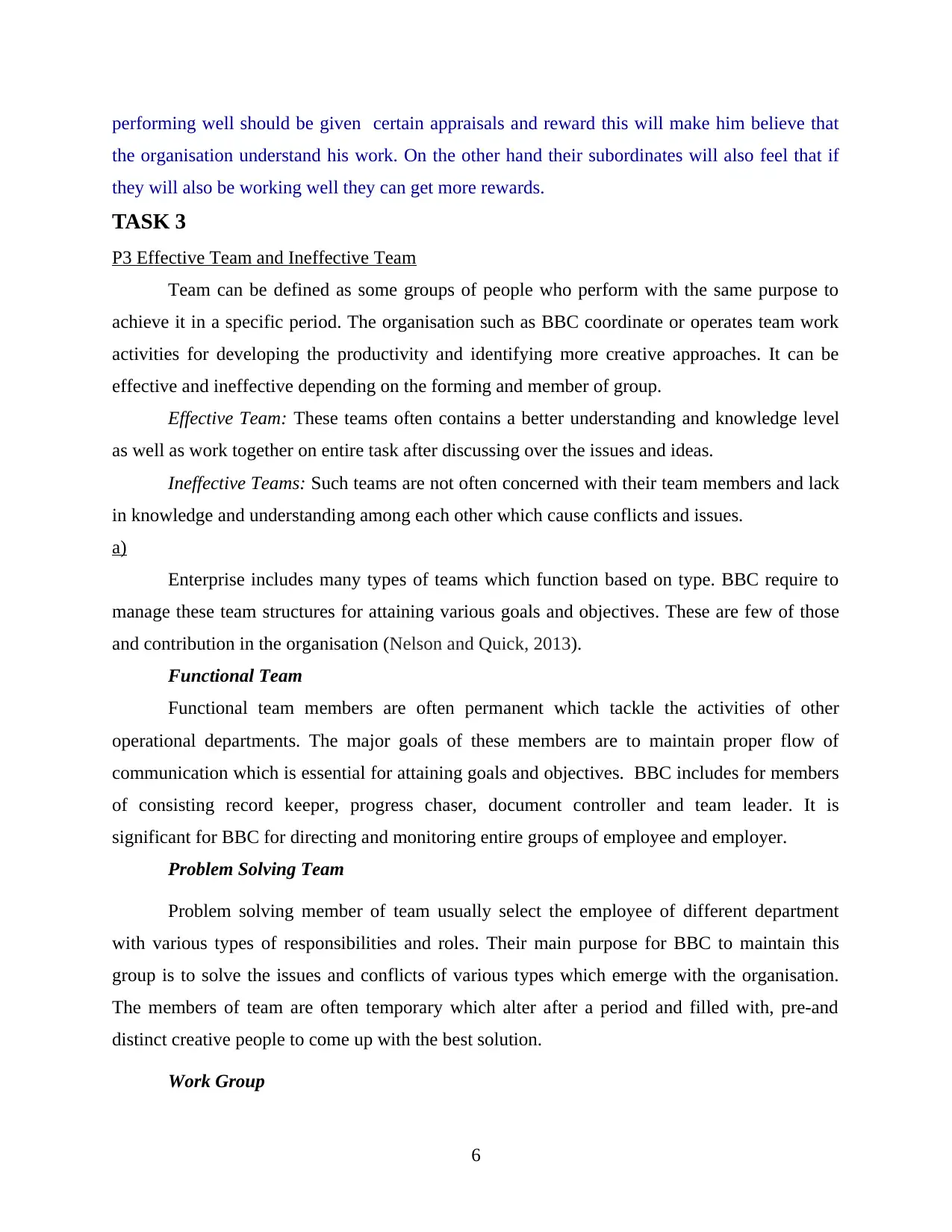
performing well should be given certain appraisals and reward this will make him believe that
the organisation understand his work. On the other hand their subordinates will also feel that if
they will also be working well they can get more rewards.
TASK 3
P3 Effective Team and Ineffective Team
Team can be defined as some groups of people who perform with the same purpose to
achieve it in a specific period. The organisation such as BBC coordinate or operates team work
activities for developing the productivity and identifying more creative approaches. It can be
effective and ineffective depending on the forming and member of group.
Effective Team: These teams often contains a better understanding and knowledge level
as well as work together on entire task after discussing over the issues and ideas.
Ineffective Teams: Such teams are not often concerned with their team members and lack
in knowledge and understanding among each other which cause conflicts and issues.
a)
Enterprise includes many types of teams which function based on type. BBC require to
manage these team structures for attaining various goals and objectives. These are few of those
and contribution in the organisation (Nelson and Quick, 2013).
Functional Team
Functional team members are often permanent which tackle the activities of other
operational departments. The major goals of these members are to maintain proper flow of
communication which is essential for attaining goals and objectives. BBC includes for members
of consisting record keeper, progress chaser, document controller and team leader. It is
significant for BBC for directing and monitoring entire groups of employee and employer.
Problem Solving Team
Problem solving member of team usually select the employee of different department
with various types of responsibilities and roles. Their main purpose for BBC to maintain this
group is to solve the issues and conflicts of various types which emerge with the organisation.
The members of team are often temporary which alter after a period and filled with, pre-and
distinct creative people to come up with the best solution.
Work Group
6
the organisation understand his work. On the other hand their subordinates will also feel that if
they will also be working well they can get more rewards.
TASK 3
P3 Effective Team and Ineffective Team
Team can be defined as some groups of people who perform with the same purpose to
achieve it in a specific period. The organisation such as BBC coordinate or operates team work
activities for developing the productivity and identifying more creative approaches. It can be
effective and ineffective depending on the forming and member of group.
Effective Team: These teams often contains a better understanding and knowledge level
as well as work together on entire task after discussing over the issues and ideas.
Ineffective Teams: Such teams are not often concerned with their team members and lack
in knowledge and understanding among each other which cause conflicts and issues.
a)
Enterprise includes many types of teams which function based on type. BBC require to
manage these team structures for attaining various goals and objectives. These are few of those
and contribution in the organisation (Nelson and Quick, 2013).
Functional Team
Functional team members are often permanent which tackle the activities of other
operational departments. The major goals of these members are to maintain proper flow of
communication which is essential for attaining goals and objectives. BBC includes for members
of consisting record keeper, progress chaser, document controller and team leader. It is
significant for BBC for directing and monitoring entire groups of employee and employer.
Problem Solving Team
Problem solving member of team usually select the employee of different department
with various types of responsibilities and roles. Their main purpose for BBC to maintain this
group is to solve the issues and conflicts of various types which emerge with the organisation.
The members of team are often temporary which alter after a period and filled with, pre-and
distinct creative people to come up with the best solution.
Work Group
6
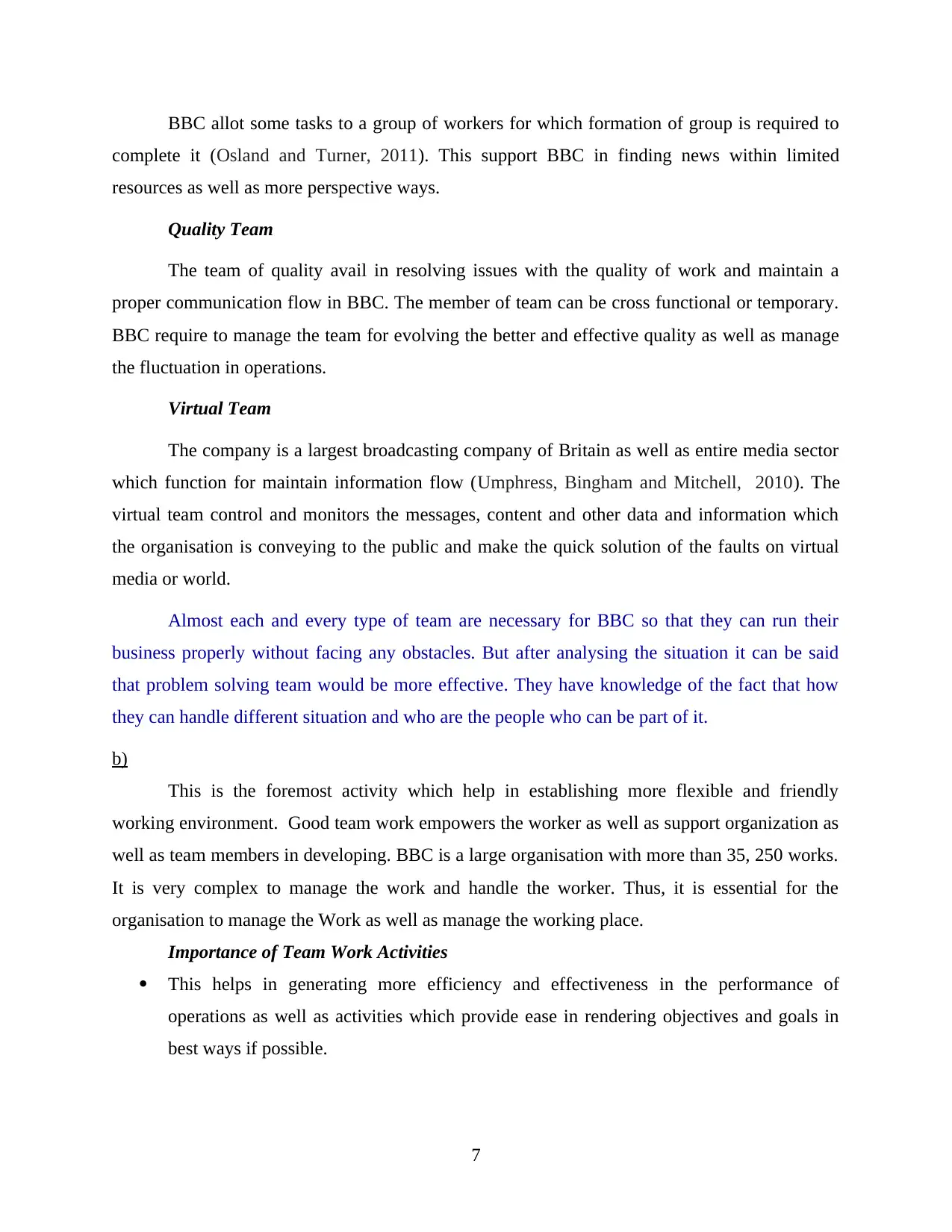
BBC allot some tasks to a group of workers for which formation of group is required to
complete it (Osland and Turner, 2011). This support BBC in finding news within limited
resources as well as more perspective ways.
Quality Team
The team of quality avail in resolving issues with the quality of work and maintain a
proper communication flow in BBC. The member of team can be cross functional or temporary.
BBC require to manage the team for evolving the better and effective quality as well as manage
the fluctuation in operations.
Virtual Team
The company is a largest broadcasting company of Britain as well as entire media sector
which function for maintain information flow (Umphress, Bingham and Mitchell, 2010). The
virtual team control and monitors the messages, content and other data and information which
the organisation is conveying to the public and make the quick solution of the faults on virtual
media or world.
Almost each and every type of team are necessary for BBC so that they can run their
business properly without facing any obstacles. But after analysing the situation it can be said
that problem solving team would be more effective. They have knowledge of the fact that how
they can handle different situation and who are the people who can be part of it.
b)
This is the foremost activity which help in establishing more flexible and friendly
working environment. Good team work empowers the worker as well as support organization as
well as team members in developing. BBC is a large organisation with more than 35, 250 works.
It is very complex to manage the work and handle the worker. Thus, it is essential for the
organisation to manage the Work as well as manage the working place.
Importance of Team Work Activities
This helps in generating more efficiency and effectiveness in the performance of
operations as well as activities which provide ease in rendering objectives and goals in
best ways if possible.
7
complete it (Osland and Turner, 2011). This support BBC in finding news within limited
resources as well as more perspective ways.
Quality Team
The team of quality avail in resolving issues with the quality of work and maintain a
proper communication flow in BBC. The member of team can be cross functional or temporary.
BBC require to manage the team for evolving the better and effective quality as well as manage
the fluctuation in operations.
Virtual Team
The company is a largest broadcasting company of Britain as well as entire media sector
which function for maintain information flow (Umphress, Bingham and Mitchell, 2010). The
virtual team control and monitors the messages, content and other data and information which
the organisation is conveying to the public and make the quick solution of the faults on virtual
media or world.
Almost each and every type of team are necessary for BBC so that they can run their
business properly without facing any obstacles. But after analysing the situation it can be said
that problem solving team would be more effective. They have knowledge of the fact that how
they can handle different situation and who are the people who can be part of it.
b)
This is the foremost activity which help in establishing more flexible and friendly
working environment. Good team work empowers the worker as well as support organization as
well as team members in developing. BBC is a large organisation with more than 35, 250 works.
It is very complex to manage the work and handle the worker. Thus, it is essential for the
organisation to manage the Work as well as manage the working place.
Importance of Team Work Activities
This helps in generating more efficiency and effectiveness in the performance of
operations as well as activities which provide ease in rendering objectives and goals in
best ways if possible.
7
⊘ This is a preview!⊘
Do you want full access?
Subscribe today to unlock all pages.

Trusted by 1+ million students worldwide
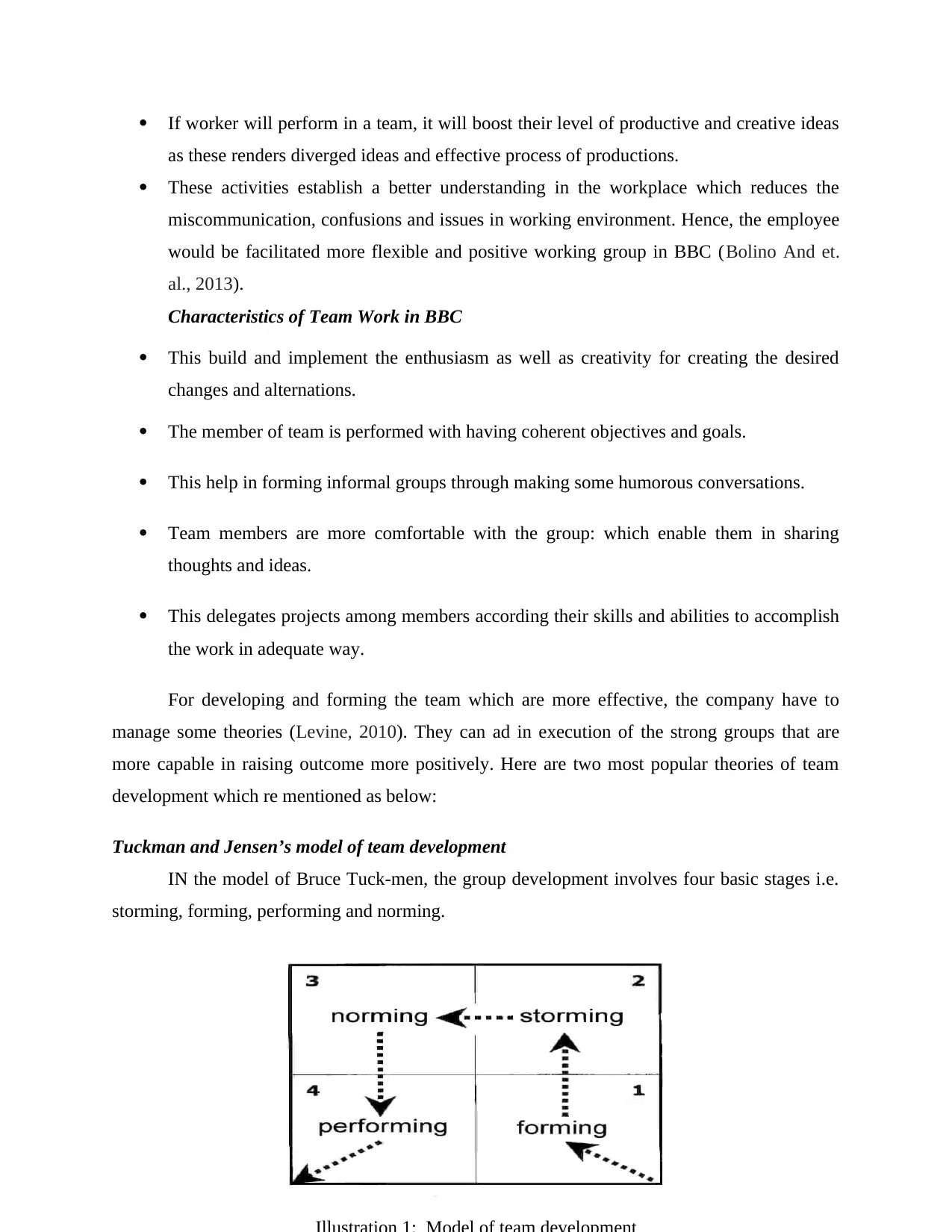
If worker will perform in a team, it will boost their level of productive and creative ideas
as these renders diverged ideas and effective process of productions.
These activities establish a better understanding in the workplace which reduces the
miscommunication, confusions and issues in working environment. Hence, the employee
would be facilitated more flexible and positive working group in BBC (Bolino And et.
al., 2013).
Characteristics of Team Work in BBC
This build and implement the enthusiasm as well as creativity for creating the desired
changes and alternations.
The member of team is performed with having coherent objectives and goals.
This help in forming informal groups through making some humorous conversations.
Team members are more comfortable with the group: which enable them in sharing
thoughts and ideas.
This delegates projects among members according their skills and abilities to accomplish
the work in adequate way.
For developing and forming the team which are more effective, the company have to
manage some theories (Levine, 2010). They can ad in execution of the strong groups that are
more capable in raising outcome more positively. Here are two most popular theories of team
development which re mentioned as below:
Tuckman and Jensen’s model of team development
IN the model of Bruce Tuck-men, the group development involves four basic stages i.e.
storming, forming, performing and norming.
8
as these renders diverged ideas and effective process of productions.
These activities establish a better understanding in the workplace which reduces the
miscommunication, confusions and issues in working environment. Hence, the employee
would be facilitated more flexible and positive working group in BBC (Bolino And et.
al., 2013).
Characteristics of Team Work in BBC
This build and implement the enthusiasm as well as creativity for creating the desired
changes and alternations.
The member of team is performed with having coherent objectives and goals.
This help in forming informal groups through making some humorous conversations.
Team members are more comfortable with the group: which enable them in sharing
thoughts and ideas.
This delegates projects among members according their skills and abilities to accomplish
the work in adequate way.
For developing and forming the team which are more effective, the company have to
manage some theories (Levine, 2010). They can ad in execution of the strong groups that are
more capable in raising outcome more positively. Here are two most popular theories of team
development which re mentioned as below:
Tuckman and Jensen’s model of team development
IN the model of Bruce Tuck-men, the group development involves four basic stages i.e.
storming, forming, performing and norming.
8
Paraphrase This Document
Need a fresh take? Get an instant paraphrase of this document with our AI Paraphraser
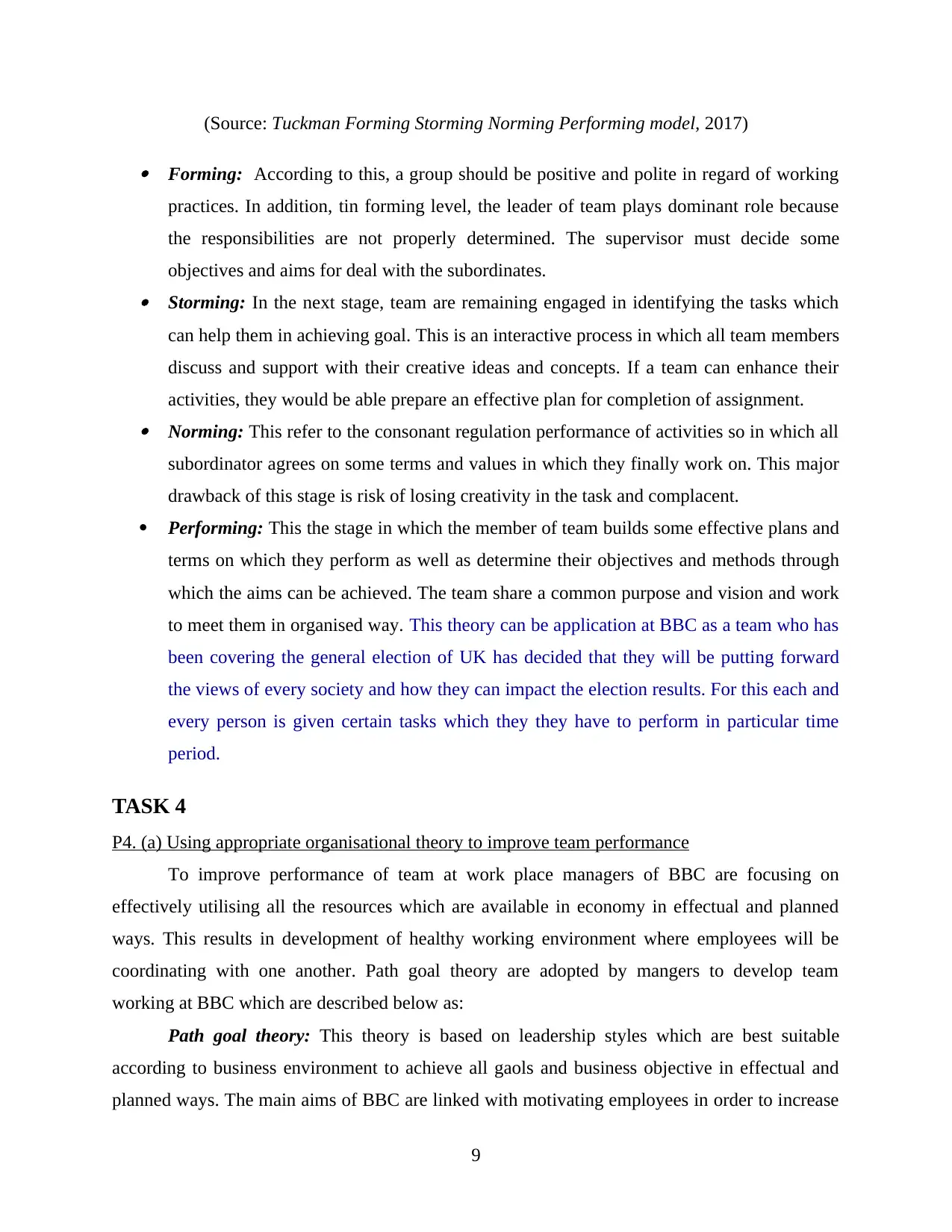
(Source: Tuckman Forming Storming Norming Performing model, 2017)
Forming: According to this, a group should be positive and polite in regard of working
practices. In addition, tin forming level, the leader of team plays dominant role because
the responsibilities are not properly determined. The supervisor must decide some
objectives and aims for deal with the subordinates. Storming: In the next stage, team are remaining engaged in identifying the tasks which
can help them in achieving goal. This is an interactive process in which all team members
discuss and support with their creative ideas and concepts. If a team can enhance their
activities, they would be able prepare an effective plan for completion of assignment. Norming: This refer to the consonant regulation performance of activities so in which all
subordinator agrees on some terms and values in which they finally work on. This major
drawback of this stage is risk of losing creativity in the task and complacent.
Performing: This the stage in which the member of team builds some effective plans and
terms on which they perform as well as determine their objectives and methods through
which the aims can be achieved. The team share a common purpose and vision and work
to meet them in organised way. This theory can be application at BBC as a team who has
been covering the general election of UK has decided that they will be putting forward
the views of every society and how they can impact the election results. For this each and
every person is given certain tasks which they they have to perform in particular time
period.
TASK 4
P4. (a) Using appropriate organisational theory to improve team performance
To improve performance of team at work place managers of BBC are focusing on
effectively utilising all the resources which are available in economy in effectual and planned
ways. This results in development of healthy working environment where employees will be
coordinating with one another. Path goal theory are adopted by mangers to develop team
working at BBC which are described below as:
Path goal theory: This theory is based on leadership styles which are best suitable
according to business environment to achieve all gaols and business objective in effectual and
planned ways. The main aims of BBC are linked with motivating employees in order to increase
9
Forming: According to this, a group should be positive and polite in regard of working
practices. In addition, tin forming level, the leader of team plays dominant role because
the responsibilities are not properly determined. The supervisor must decide some
objectives and aims for deal with the subordinates. Storming: In the next stage, team are remaining engaged in identifying the tasks which
can help them in achieving goal. This is an interactive process in which all team members
discuss and support with their creative ideas and concepts. If a team can enhance their
activities, they would be able prepare an effective plan for completion of assignment. Norming: This refer to the consonant regulation performance of activities so in which all
subordinator agrees on some terms and values in which they finally work on. This major
drawback of this stage is risk of losing creativity in the task and complacent.
Performing: This the stage in which the member of team builds some effective plans and
terms on which they perform as well as determine their objectives and methods through
which the aims can be achieved. The team share a common purpose and vision and work
to meet them in organised way. This theory can be application at BBC as a team who has
been covering the general election of UK has decided that they will be putting forward
the views of every society and how they can impact the election results. For this each and
every person is given certain tasks which they they have to perform in particular time
period.
TASK 4
P4. (a) Using appropriate organisational theory to improve team performance
To improve performance of team at work place managers of BBC are focusing on
effectively utilising all the resources which are available in economy in effectual and planned
ways. This results in development of healthy working environment where employees will be
coordinating with one another. Path goal theory are adopted by mangers to develop team
working at BBC which are described below as:
Path goal theory: This theory is based on leadership styles which are best suitable
according to business environment to achieve all gaols and business objective in effectual and
planned ways. The main aims of BBC are linked with motivating employees in order to increase
9
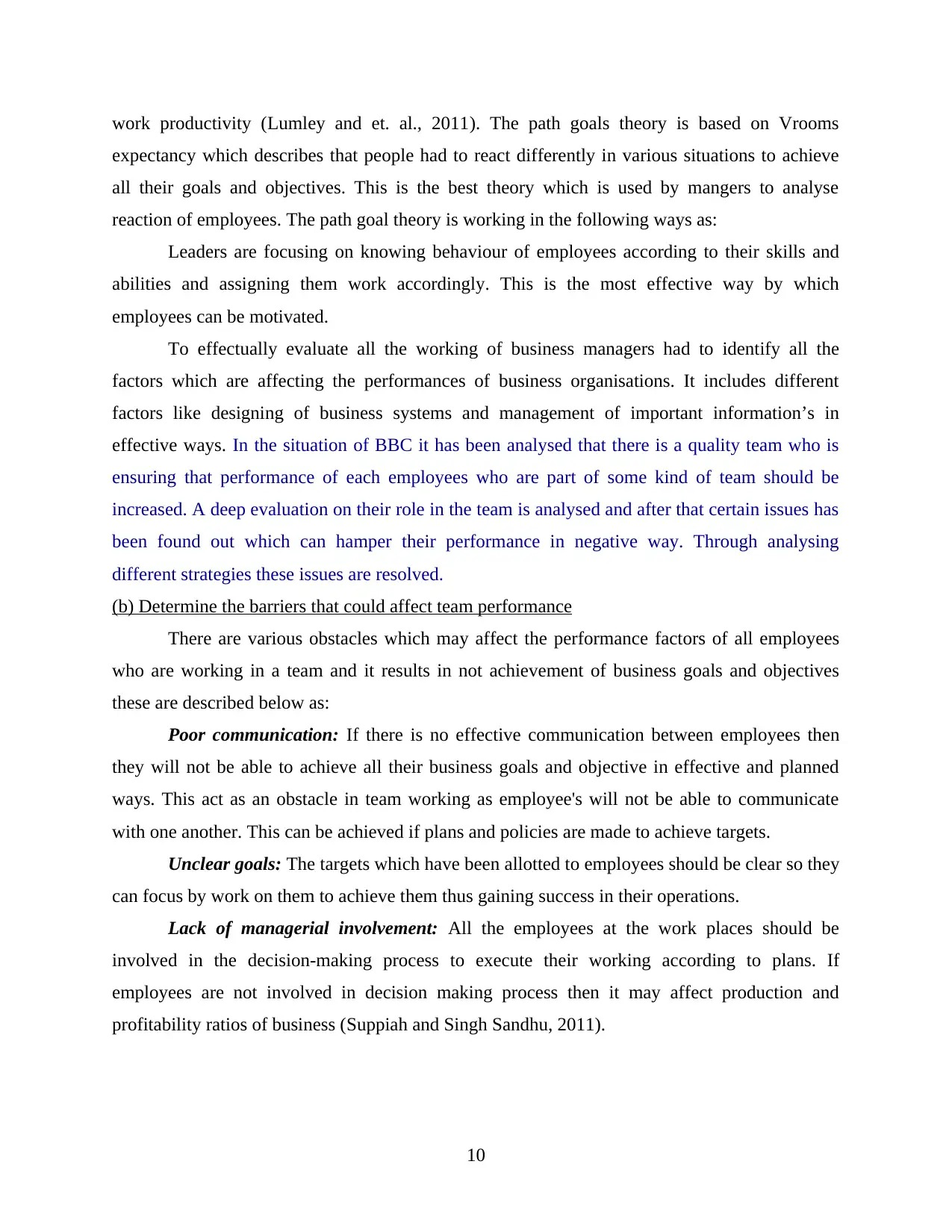
work productivity (Lumley and et. al., 2011). The path goals theory is based on Vrooms
expectancy which describes that people had to react differently in various situations to achieve
all their goals and objectives. This is the best theory which is used by mangers to analyse
reaction of employees. The path goal theory is working in the following ways as:
Leaders are focusing on knowing behaviour of employees according to their skills and
abilities and assigning them work accordingly. This is the most effective way by which
employees can be motivated.
To effectually evaluate all the working of business managers had to identify all the
factors which are affecting the performances of business organisations. It includes different
factors like designing of business systems and management of important information’s in
effective ways. In the situation of BBC it has been analysed that there is a quality team who is
ensuring that performance of each employees who are part of some kind of team should be
increased. A deep evaluation on their role in the team is analysed and after that certain issues has
been found out which can hamper their performance in negative way. Through analysing
different strategies these issues are resolved.
(b) Determine the barriers that could affect team performance
There are various obstacles which may affect the performance factors of all employees
who are working in a team and it results in not achievement of business goals and objectives
these are described below as:
Poor communication: If there is no effective communication between employees then
they will not be able to achieve all their business goals and objective in effective and planned
ways. This act as an obstacle in team working as employee's will not be able to communicate
with one another. This can be achieved if plans and policies are made to achieve targets.
Unclear goals: The targets which have been allotted to employees should be clear so they
can focus by work on them to achieve them thus gaining success in their operations.
Lack of managerial involvement: All the employees at the work places should be
involved in the decision-making process to execute their working according to plans. If
employees are not involved in decision making process then it may affect production and
profitability ratios of business (Suppiah and Singh Sandhu, 2011).
10
expectancy which describes that people had to react differently in various situations to achieve
all their goals and objectives. This is the best theory which is used by mangers to analyse
reaction of employees. The path goal theory is working in the following ways as:
Leaders are focusing on knowing behaviour of employees according to their skills and
abilities and assigning them work accordingly. This is the most effective way by which
employees can be motivated.
To effectually evaluate all the working of business managers had to identify all the
factors which are affecting the performances of business organisations. It includes different
factors like designing of business systems and management of important information’s in
effective ways. In the situation of BBC it has been analysed that there is a quality team who is
ensuring that performance of each employees who are part of some kind of team should be
increased. A deep evaluation on their role in the team is analysed and after that certain issues has
been found out which can hamper their performance in negative way. Through analysing
different strategies these issues are resolved.
(b) Determine the barriers that could affect team performance
There are various obstacles which may affect the performance factors of all employees
who are working in a team and it results in not achievement of business goals and objectives
these are described below as:
Poor communication: If there is no effective communication between employees then
they will not be able to achieve all their business goals and objective in effective and planned
ways. This act as an obstacle in team working as employee's will not be able to communicate
with one another. This can be achieved if plans and policies are made to achieve targets.
Unclear goals: The targets which have been allotted to employees should be clear so they
can focus by work on them to achieve them thus gaining success in their operations.
Lack of managerial involvement: All the employees at the work places should be
involved in the decision-making process to execute their working according to plans. If
employees are not involved in decision making process then it may affect production and
profitability ratios of business (Suppiah and Singh Sandhu, 2011).
10
⊘ This is a preview!⊘
Do you want full access?
Subscribe today to unlock all pages.

Trusted by 1+ million students worldwide
1 out of 15
Related Documents
Your All-in-One AI-Powered Toolkit for Academic Success.
+13062052269
info@desklib.com
Available 24*7 on WhatsApp / Email
![[object Object]](/_next/static/media/star-bottom.7253800d.svg)
Unlock your academic potential
Copyright © 2020–2026 A2Z Services. All Rights Reserved. Developed and managed by ZUCOL.





